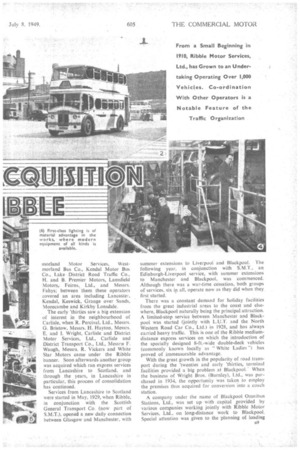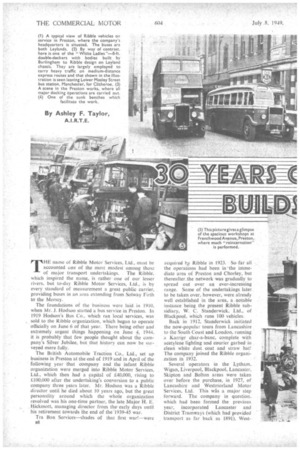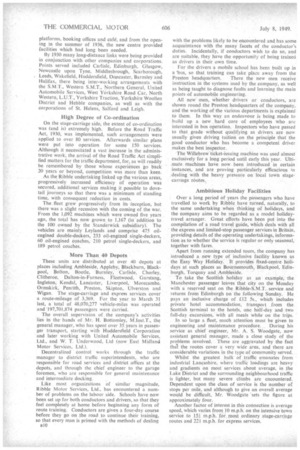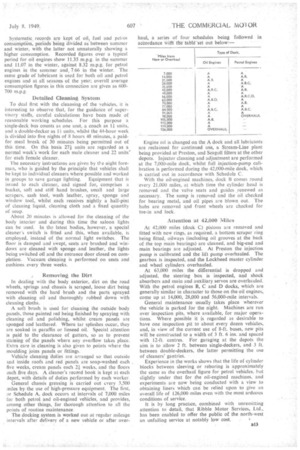eQUOSO
Page 17

Page 16

Page 18

Page 19

If you've noticed an error in this article please click here to report it so we can fix it.
IlL By Ashley F. Taylor,
A.I.R.T.E.
THE name of Ribble Motor Services, Ltd., must be accounted one of the most modest among those
of major transport undertakings. The Ribble. which inspired the name, is rather one of our lesser rivers, but to-day Ribble Motor Services, Ltd., is by every standard of measurement a great public carrier, providing buses in an area extending from Solway Firth to the Mersey. . ,
The foundations of the business were laid in 1910, when Mr. J. Hodson started a bus service in Preston. In 1919 Hodson's Bus Co., which ran local services, was sold to the Ribble organization, which began to operate officially on June 6 of that year. There being other and extremely urgent things happening on June 4, 1944, it is probably that few people thought about the company's Silver Jubilee, but that history can now be surveyed more fully.
The British Automobile Traction Co., Ltd., set up business in Preston at the end of 1919 and in April of the following year that company and the infant Ribble organization were merged into Ribble Motor Services, Ltd., which then had a capital of £40,000, rising to £100,000 after the undertaking's conversion to a public company three years later. Mr. Hodson was a Ribble director until he died about 10 years ago, but the great personality around which the whole organization revolved was his one-time partner, the late Major H. E. Hickmott, managing director from the early days until his retirement towards the end of the 1939-45 war.
Tra Bon Services—shades of that first war!--were s8 acquired 1-,y Ribble in 1923. So far all the operations had been in the immediate area of Preston and Charley, but thereafter the network was gradually to spread out over an ever-increasing range. Some of the undertakings later to be taken over, however, were already well established in the area, a notable instance being the present Ribble subsidiary, W. C. Standerwick, Ltd., of Blackpool. which runs 100 vehicles.
Back in 1912, Standerwick initiated the now-popular tours from Lancashire to the South Coast and London. running a Karricr char-a-banc, complete with acetylene lighting and courier garbed in clean white dust coat and straw hat! The company joined the Ribble organization in 1932.
Several operators in the Lytham. Wigan, Liverpool, Blackpool, Lancaster. Skipton and Bolton areas were taken over before the purchase, in 1927, of Lancashire and Westmorland Motor Services, Ltd. This was a major step forward. The company in question, which had been formed the previous year, incorporated Lancaster and District Tramways (which had provided transport as far back as 1891), West
morland Motor Services, Westmorland Bus Co., Kendal Motor Bus Co., Lake District Road Traffic Co., R. and B. Premier Motors, Lamsfield Motors, Feirns,, Ltd., and Messrs. Fahys; between them these operators covered an area including Lancaster, Kendal, Keswick, Grange over Sands, Morecambe and Kirkby Lonsdale.
The early 'thirties saw a big extension of interest in the neighbourhood of Carlisle, when R. Percival, Ltd., Messrs. G. Bristow, Messrs. H. Hayton, Messrs. E. and I. Wright, Carlisle and District Motor Services, Ltd., Carlisle and District Transport Co., Ltd., Messrs, F. Waugh, Messrs. R. Vickers and White Star Motors came under the Ribble banner. Soon afterwards another group was acquired which ran express services from Lancashire to Scotland, and through the years, in Lancashire in particular, this process of consolidation has continued.
Services from Lancashire to Scotland were started in May, 1929, when Ribble, in .conjunction with the Scottish General Transport Co. (now part of S.M.'T.), opened a new daily connection between Glasgow and Manchester, with summer extensions to Liverpool and Blackpool. The following year, in conjunction with S.M.T., an Edinburgh-Liverpool service, with summer extensions to Manchester and Blackpool, was commenced. Although there was a war-time cessation, both groups of services, six in all, operate now as they did when they first started.
There was a constant demand for holiday facilities from the great industrial areas to the coast and elsewhere, Blackpool naturally being the principal attraction. A limited-stop service between Manchester and Blackpool was started (jointly with L.U.T. and the North Western Road Car Co., Ltd.) in 1928, and has always carried heavy traffic. This is one of the Ribble mediumdistance express services on which the introduction of the specially designed 8-ft.-wide double-deck vehicles (commonly known locally as "White Ladies ") has proved of immeasurable advantage.
With the great growth in the popularity of road transport during the 'twenties and early 'thirties, terminal facilities provided a big problem at Blackpool. When the business of Wright Bros. (Burnley), Ltd., was purchased in 1934, the opportunity was taken to employ the premises thus acquired for conversion into a coach station.
A company under the name of Blackpool Omnibus Stations, Ltd., was set up with capital provided by various companies working jointly with Ribble Motor Services, Ltd., on long-distance work to Blackpool. Special attention was given to the planning of loading
platforms, booking offices and cafC and from the opening in the summer of 1936, the new centre provided facilities which had long been needed.
By 1930 many long-distance links were being provided in conjunction with other companies and corporations. Points served included Carlisle, Edinburgh, Glasgow, Newcastle upon Tyne, Middlesbrough, Scarborough, Leeds, Wakefield, Huddersfield, Doncaster, Barnsley and Halifax, there being inter-working arrangements with the S.M.T., Western S.M.T., Northern General, United Automobile Services, West Yorkshire Road Car, North Western, L.U.T., Yorkshire Traction, Yorkshire Woollen District and Hebble companies, as well as with the corporations of St. Helens, Salford and Leigh.
High Degree of Co-ordination
On the stage-carriage side, the extent of co-ordination was (and is) extremely high. Before the Road Traffic Act, 1930, was implemented, such arrangements were applied to over 80 services. Afterwards similar plans were put into operation for some 150 services. Although it necessitated a vast increase in the administrative work, the arrival of the Road Traffic Act simplified matters for the traffic department, for, as will readily be remembered by those whose experiences go back 20 years or beyond, competition was more than keen.
As the Ribble undertaking linked up the various areas, progressively increased efficiency of operation was secured, additional services making it possible to dovetail journeys so that there was a minimum of standing time, with consequent reduction in costs.
The fleet grew progressively from its inception, but there was a slight recession with the coming of the war. From the 1,092 machines which were owned five years ago, the total has now grown to 1,167 (in -addition to the 100 owned by the Standerwick subsidiary). The vehicles are mainly Leylands and comprise 475 oilengined double-deckers, 233 oil-engined single-deckers, 60 oil-engined coaches, 210 petrol single-deckers, and 189 petrol coaches.
More Than 40 Depots These units are distributed at over 40 depots at places including Ambleside, Appleby, Blackburn, Blackpool, Bolton, Bootle, Burnley, Carlisle, Chorley, Clitheroe, Dalton-in-Furness, Fleetwood, Garstang, Ingleton, Kendal, Lancaster, Liverpool, Morecambe, Ormskirk, Penrith, Preston, Skipton, Ulverston and Wigan. The stage-carriage and express services cover a route-mileage of 3,369. For the year to March 31 last, a 'total of 48,070,277 vehicle-miles was operated and '197,701,874 passengers were carried.
The overall supervision of the company's activities lies in the hands of Mr. H. Bottomley, M.Inst.T., the general manager, who has spent over 35 years in passenger transport, starting with Huddersfield Corporation and later working with United Automobile ServiCes, Ltd., and W. T. Underwood, Ltd (now East Midland Motor Services, Ltd.).
Decentralized control • works through the traffic manager to district traffic superintendents, who are responsible for road services and district offices at the depots, and through the chief engineer to the garage foremen, who are responsible for general maintenance and intermediate docking.
Like most organizations of similar magnitude, Ribble Motor Services, Ltd., has encountered a number of problems on the labour side. Schools have now been set up for both conductors and drivers, so that they feel completely at home before beginning any form of route training. Conductors are given a four-day course before they go on the road to continue their training, so that every man is primed with the methods of dealing with the problems likely to be encountered and has some acquaintance with the many facets of the conductor's duties. Incidentally, if conductors wish to do so, and are suitable, they have the opportunity of being trained as drivers in their own time.
For the drivers a mobile school has been built up in a 'bus, so that training can take place away from the Preston headquarters. There the new men receive instruction in the systems used by the company, as well as being taught to diagnose faults and learning the main points of automobile engineering.
All new men, whether drivers or conductors, are shown round the Preston headquarters of the company, and the working of the various departments is explained to them. In this way an endeavour is being made to build up a new hard core of employees who are interested in bus operation. Inspectors who have passed to that grade without qualifying as drivers are now usually given driving tuition on the principle that the good conductor who has become a competent driver makes the best inspector.
The Willebrew ticket-issuing machine was used almost exclusively for a long period until early this year. Ultimate machines have now been introduced in certain instances, and are proving particularly efficacious in dealing with the heavy pressure on local town stagecarriage routes.
Ambitious Holiday Facilities
Over a long period of years the passengers who have travelled to work by Ribble have turned, naturally, to the same undertaking when thinking of holidays, and the company aims to be regarded as a model holidaytravel arranger. Great efforts have been put into the compilation of a road travel guide, which deals with all the express and limited-stop passenger services in Britain, providing details of the operating undertakings, information as to whether the service is regular or only seasonal, together with fares.
Apart from running extended tours, the company has introduced a new type of inclusive facility known as the Easy Way Holiday. It provides fixed-centre holidays at such places as Bournemouth, Blackpool, Edinburgh, Torquay and Ambleside.
To take the Scottish holiday as an example, the Manchester passenger leaves that city on the Monday with a reserved seat on the Ribble-S.M.T. service and returns from Edinburgh on the following Sunday. He pays an inclusive charge of 12 5s., which includes private hotel accommodation, transport from the Scottish terminal to the hotels, one half-day and two full-day excursions, with all meals while on the trips.
In so large a fleet, much attention must be given to engineering and maintenance procedure. _ During his service as chief engineer, Mr. A. S. Woodgate, now assistant general manager, made a close study of the problems involved. These are aggravated by the fact that the routes cover a very wide area, and there are considerable variations in the type of community served.
Whilst the greatest bulk of traffic emanates from industrial Lancashire, where traffic loadings are heavy and gradients on most services about average, in the Lake District and the surrounding neighbourhood traffic is lighter, but many severe climbs are encountered. Dependent upon the class of service is the number of stops per mile, and although to give an overall average would be difficult, Mr. Woodgate 'sets the figure at approximately four.
Another factor of interest in this connection is average speed, which varies from, 10 m.p.h. on the intensive town service to 15: m.p.h. for most ordinary stage-carriage routes and 221 m.p.h. for express services.
Systematic, records are kept of oil, fuel and petrol ionstiniptiOn, periods being divided as between summer and winter, with the latter not unnaturally showing a higher consumption. Recorded figures over a typical period for oil engines show 11.35 m.p.g. in the summer and 11.07 in the winter, against 8.32 m.p.g. for petrol engines in the summer and, 7.66 in the winter. The same grade of lubricant is used for both oil and petrot engines and at all seasons of the year; overall average consumption figures in this connection are given as 600700 in.p.g Detailed Cleaning System To deal first with the cleansing of the vehicles, it is interesting to observe that, for the guidance of supervisory staffs, careful calculations have been made of reasonable working schedules. For this purpose a single-deck bus counts as one unit, a coach as 1.1 units, and a double-decker as 11units, whilst the 44-hour week . is divided into five nights of 8 hours 48 Minutes, a paidfor meal break of 30 minutes being permitted out of this time. On this basis 271 units are regarded as a normal week's work for each male cleaner and 22 units" for each female cleaner.
The necessary instructions are given by the night foreman, who is guided by the principle that vehicles shall be kept to individual cleaners where possible and worked in groups to save garage lighting. Equipment that is issued to each cleaner, and signed for, comprises a bucket, soft and stiff hand brushes, small and large scrapers, sash tool, wash leather, spray, sponge and window tool, whilst each receives nightly a half-pint of cleaning liquid, cleaning cloth and a fixed quantity of soap.
About 20 minutes is allowed for the cleaning of the body interior and during this time the saloon lights can be used. In the latest bodies, however, a special cleaner's switch is fitted and this, when available, is employed, instead of the . normal light switches. The floor is damped and swept, seats are brushed and windows are cleaned with sponge and leather, the lights. being switched oil and the entrance door closed on completion. Vacuum .cleaning is performed on seats and cushions every three weeks_
Removing the Dirt
In dealing with the body exterior, dirt on the road wheels, springs and chassis is scraped, loose dirt being removed with the hard brush and the parts. sprayed with cleaning oil and thoroughly rubbed down with cleaning cloths.
A soft brush is used for cleaning the outside body panels, those painted red being finished by spraying with cleaning oil, and polishing, whilst cream panels are sponged and leathered. Where tar splashes occur, they are soaked in paraffin or linseed oil. Special attention is paid to the clearance of gutters, so as to prevent staining of the panels where any overflow takes place. Extra care in cleaning is also given to points where the moulding joins panels or fittings.
Vehicle cleaning duties" are arranged so that outside and inside roofs and red 'panels are soap-washed each five weeks, cream panels each 21 weeks, and the floors each five days. A, cleaner's reccrrd book, is kept at each depot, with details of duties performed by each worker.
General chassis greasing is carried out every 3,500 miles bythe use of high-pressure equipment. The first, or Schedule A, dock occurs at intervals of 7,000 miles for both petrol and oil-enginecl vehicles, and provides, among other things, for thorough attention to all the points of routine maintenance
The docking system is worked out mileage intervals after delivery of a new vehicle or after over Engine Oil is changed on the A dock and all lubricants are reclaimed for continued uSe, a Stream-Line plant being provided at Preston, and Seagull filters at the other depots. Injector cleaning and adjustment are performed at the 7,000-mile dock, whilst full injection-pump calibration is performed during the 42,000-mile dock, which is carried out in accordance with Schedule C.
With the oil-engined machines, dock B comes round every 21,000 miles, at which time the cylinder head is removed and the valve seats and guides renewed as necessary. The sump is removed and the oil checked for bearing metal, and oil pipes are blown out. The hubs are removed and front wheels are checked for toe-in and lock.
Attention at 42,000 Mlles At 42,000 miles (dockC) pistons are removed and fitted with new rings, as required, a bottom scraper ring being fitted, oilways (including oil grooves at the back of the top main bearings) are cleaned, and big-end and main bearings are adjusted. At Preston the injection pump is calibrated and the lift pump overhauled. The gearbox is inspected, and the Lockheed master cylinder and wheel cylinders overhauled.
At 63,000 miles the differential is dropped and adjusted, the steering box is inspected, and shock absorbers and main and auxiliary servos are overhauled. With the petrol engines B, C and D docks,. which are generally similar in character to those on the oil engines, come up at 14,000, 28,000 and 56,000-mile intervals.
General maintenance usually takes place wherever the vehicle is parked for the night. Machines are run over inspection pits, where available, for major operations. Where possible it is regarded as desirable to have one inspection pit to about every dozen vehicles, and, in view of the current use of 8-ft. buses, new pits will be constructed to a width of 3 ft. 6 ins, and spaced with 12-ft. centres. For garaging at the depots the aim. is to allow 2 ft. between single-deckers, and -3 ft. between double-deckers, the latter permitting the use of cleaners' gantrieS.
Experience in the works shows that the life of cylinder blocks between sleeving or reboring is approximately the same as the overhaul figure for petrol vehicles, hut slightly under that for• the oil-engined machines, and experiments are now being conducted with a view to obtaining liners which can be relied upon to give an overall life of 126,000 miles even with the most arduous conditions of service.
It is by long practice, combined with unremitting attention to detail, that Ribble Motor Services, Ltd., has been enabled to offer the public of the north-west an unfailing service at notably low cost.


























